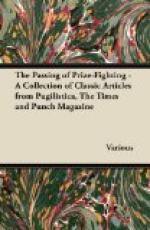Mr. Titus Livingstone possesses an excellent heart, a good fortune, and an uncommon stock of modesty. His intellects are, however, far from brilliant; indeed, but for one trait in his character he would pass for an idiot,—he has had the good sense never as yet to fall in love! In fact, the farce is founded upon that identical incident of his life which occasioned him to suppose that he had taken the tender passion extempore.
Some sort of villany seems absolutely necessary to every species of play. To continue the parallel we commenced with between tragedy and farce, we observe that in the former he is usually such a person as Spinola, in “Nina Sforza,” whilst a farce-villain turns out to be in most instances an intriguing widow, a lawyer, or a mischievous young lady. The rogue in “Love Extempore” is Mrs. Courtnay, a widow, who, with the assistance of Sir Harry Nugent, contrives a plot by which the hitherto insensible Livingstone shall fall a victim to love and her friend Prudence Oldstock; with whose mother and sister the widow and her co-intriguant are staying on a visit.
The moment fatal to Livingstone’s virgin heart and unrestrained liberty arrives. He calls to pay a morning visit, and instantly the deep design is put into execution. Sir Harry begins by a most extravagant puff preliminary of the talents, accomplishments, virtues, beauty, disposition, endowments, and graces belonging to the enchanting Prudence. He and the widow exhibit her drawings,—Livingstone is in raptures, or pretends to be (for he is not an ill-bred man). What a piercing expression flashes from those studies of eyes (in chalk)! what an artistical grouping of legs! what a Saracen’s-head-upon-Snow-hill-like ferocity frowns from that Indian chief!
At this juncture the captivating artist is herself introduced. Mr. Livingstone’s modesty strikes him into a heap of confusion. “He sighs and looks, and looks and sighs again,”—he does not know “what to say, or how to say it; so that the trembling bachelor may become a wise and good lover.” He stutters and hems in the utmost distress; to increase which, all his tormentors turn up the stage, leaving him to entertain the lady alone. The sketches naturally suggest a topic, and, plunging in medias res at once, he vehemently praises her legs! The lady is astonished, and the mamma alarmed; but having explained that the allusion was to the drawings, he is afterwards punished for the blunder by being threatened with a song. Though at a loss to find out what he has done to deserve such an infliction, he submits; for he is very sleepy, and sinks into a chair in an attitude of supposed attention, but really in a posture best adapted for a nap. When the song is ended the applause of course comes in; this awakens Livingstone in a fright; he starts, and throws down a harp in his fall.




